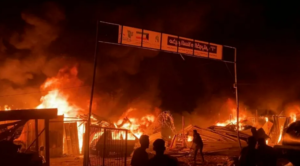The Israeli-Palestinian conflict, Israel conducted airstrikes on a camp for displaced people in Rafah, located in the southern Gaza Strip, on May 26, 2024. This retaliatory strike came hours after Hamas launched a “large rocket barrage” targeting Tel Aviv, marking a significant intensification of hostilities. The strikes resulted in at least 35 Palestinian casualties, including many women and children, and have drawn international attention and condemnation.

The Incident
Hamas’s Rocket Attack on Tel Aviv
The conflict escalated when Hamas fired multiple rockets at Tel Aviv, Israel’s commercial hub, breaking a period of relative calm. According to the Israeli military, at least eight rockets were launched from Rafah, with some targeting central areas of Tel Aviv. The attack, which took place early Sunday, was described by Hamas as a response to what they termed “Zionist massacres against civilians.”
Israeli Airstrikes in Rafah
In retaliation, the Israeli military launched airstrikes on a displacement camp in Rafah. The strikes targeted a Hamas compound, killing two senior Hamas officials, Yassin Rabia and Khaled Nagar, who were reportedly responsible for operations in the West Bank. The airstrikes led to significant casualties, with the health ministry in the Hamas-run territory reporting 35 deaths and numerous injuries.
Impact on Civilians
The airstrikes have had a devastating impact on the civilian population in Rafah. The area targeted by the Israeli military housed many displaced persons who had fled from more dangerous regions. According to the Palestinian Red Crescent, a large number of casualties were transported from the strike site, many of whom were women and children.
One survivor recounted the horror of the attack to Al Jazeera, describing how he was separated from his family and sustained severe injuries. Another witness described the air raid as having “burned an entire block,” emphasizing the catastrophic impact on the community.
International Reactions
Condemnations and Calls for Restraint
The airstrikes have drawn sharp criticism from various international bodies and governments. The Hamas-run government media office in Gaza labeled the attack a “horrific massacre,” while the Palestinian presidency in the West Bank accused Israeli forces of deliberately targeting displaced persons. The Palestinian civil defense agency reported at least 50 casualties, with the area housing around 100,000 displaced people.
Israel’s Justification and Global Diplomacy
The Israeli military defended its actions, stating that the strikes were based on precise intelligence and targeted legitimate military objectives under international law. They acknowledged reports of civilian harm and announced an investigation into the incident. Israeli Prime Minister Benjamin Netanyahu affirmed the continuation of the offensive, emphasizing the need to root out Hamas fighters and rescue hostages purportedly held in Rafah.
Broader Context of the Conflict
Recent Escalations
This incident is part of a broader pattern of escalating violence between Israel and Hamas. The conflict saw a significant flare-up on October 7, 2023, when Hamas-led militants attacked southern Israeli communities, resulting in around 1,200 deaths and over 250 hostages, according to Israeli figures. Israel’s subsequent military operations have aimed to dismantle Hamas’s infrastructure and neutralize its leadership.
Also Read : Israel Military Offensive Expands to Gaza Last Refuge of Rafah
Legal and Humanitarian Concerns
The ongoing conflict has raised serious legal and humanitarian concerns. The International Court of Justice recently issued a ruling ordering Israel to halt its operations to spare civilians, a directive Israel has contested. Despite international calls for restraint, both sides have continued their aggressive actions, exacerbating the humanitarian crisis in Gaza.
Conclusion
The recent Israeli airstrikes on Rafah, following Hamas’s rocket attack on Tel Aviv, underscore the persistent and escalating nature of the Israeli-Palestinian conflict. The heavy civilian toll highlights the dire humanitarian situation in Gaza and the urgent need for renewed diplomatic efforts to prevent further bloodshed. As international bodies and governments react to the latest violence, the path to peace remains fraught with challenges and complexities.